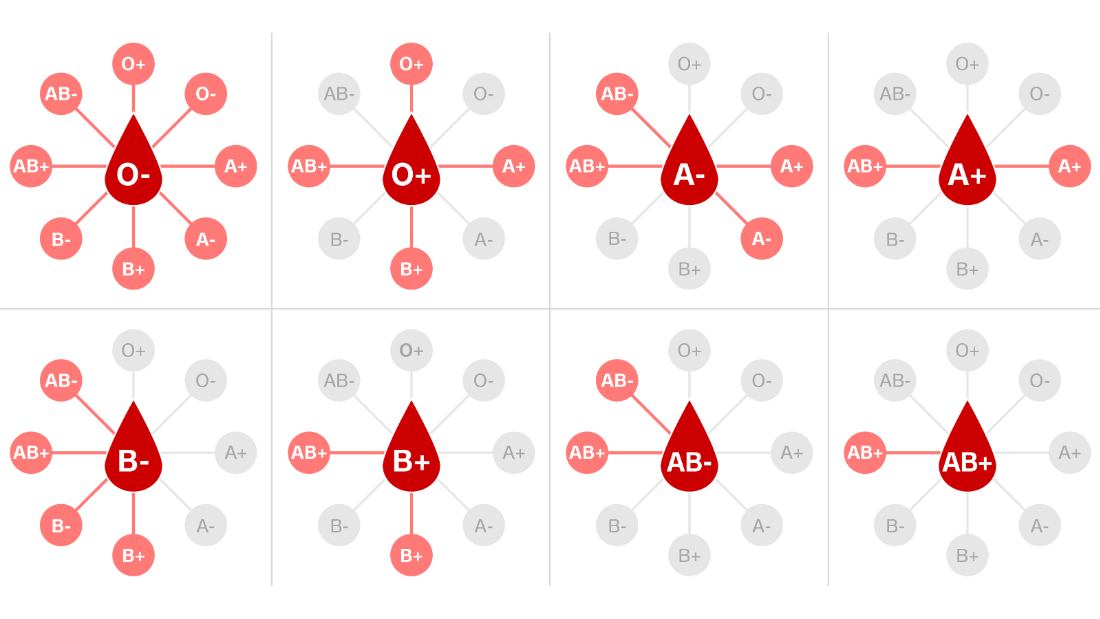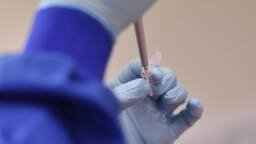Ordinarily, your blood type makes very little difference in your daily life except if you need to have a blood transfusion.
But why we have blood types and what purpose they serve is still largely unknown, and very little is known about their links to viruses and disease. Unlocking what role blood types play would potentially help scientists better understand the risk of disease for people in different blood groups.
“I think it’s fascinating, the evolutionary history, even though I don’t think we have the answer of why we have different blood types,” said Laure Segurel, a human evolutionary geneticist and a researcher at the National Museum of Natural History in France.
Why they matter
What he didn’t know is that humans should only get blood from certain other humans.
Here’s why: Your ABO blood group is identified by antibodies, part of the body’s natural defense system, and antigens, a combination of sugars and proteins that coat the surface of red blood cells. Antibodies recognize any foreign antigens and tell your immune system to destroy them. That’s why giving someone blood from the wrong group can be life-threatening.
For example, I have type A+ blood. If a doctor accidentally injected me with type B, my antibodies would reject and work to break down the foreign blood. My blood would clot as a result, disrupt my circulation and cause bleeding and difficulties breathing — and I would potentially die. But if I received type A or type O blood, I would be fine.
Your blood type is also determined by Rh status — an inherited protein found on the surface of red blood cells. If you have it, you’re positive. If you don’t, you’re negative.
Most people are Rh positive, and those people can get blood from negative or positive blood type matches. But people with Rh-negative blood typically should only get Rh-negative red blood cells (because your own antibodies may react with the incompatible donor blood cells.)
That leaves us with eight possible primary blood types, although there are a few more rare ones.
Evolutionary puzzle
“A lot of primate species … also have the differences of being A, being B, being AB,” Segurel said. “Whether it’s a great ape or a new world monkey, it’s quite intriguing that the differences have been found or maintained in so many different species.”
Blood types are unlikely to have lasted so long by chance. They must give us some kind of evolutionary advantage, Segurel said.
The ABO blood type gene doesn’t just influence our blood; it’s also active in a wider variety of tissues and organs, including our digestive or respiratory system, Segurel explained. This may be important when our bodies confront infection with different blood types offering us protection from different pathogens and diseases.
“The evolutionary interest of maintaining these (blood) types might not be related to their function in the blood but likely to their function in respiratory or digestive tissues,” she said. “They are the two places where you have most contact with viruses and bacteria — the places where you inhale the air and the digestive tissue.”
“If you imagine a cocktail of pathogens … there could be a cycle of sometimes B being advantageous, sometimes it’s A. Cycling through those different preferences and you end up with a population with different blood types.”
While we don’t know precisely how, Segurel said that the variation in the blood-type gene influences our susceptibility to different diseases. What we do know is that certain blood groups are more vulnerable to certain diseases.
So what about coronavirus?
A handful of studies have shown a link between blood type and the novel coronavirus, though most involved a small number of people and some were not peer reviewed.
A team of European researchers who published their findings in the New England Journal of Medicine in June found people with Type A blood had a 45% higher risk of becoming infected than people with other blood types, and people with Type O blood were just 65% as likely to become infected as people with other blood types. They studied more than 1,900 severely ill coronavirus patients in Spain and Italy, and compared them to 2,300 people who were not sick.
He said it could also be explained by the likelihood that the virus will carry the infected person’s blood group antigen. As such, the antibodies produced by a person with blood group O might neutralize the virus when caught from a person with blood group A — similar to the rules for blood transfusions.
“However, this protection mechanism would not work in all situations. A blood group O person could infect another blood group O person for example,” he explained, adding that any protective effect is unlikely to be large and the amounts of antibodies are highly variable from person to person.
People with type A should not be alarmed, nor should people with type O relax, said Sakthivel Vaiyapuri, an associate professor in cardiovascular and venom pharmacology at the University of Reading in the UK.
Vaiyapuri, in collaboration with Thi-Qar University in Iraq, is conducting a study into the role of blood types based on data from more than 4,000 people in Iraq who had Covid-19 and 4,000 who didn’t get sick. He said that early results suggest type O might have a protective effect, but it’s not definitive. And given how very many underlying variables there are, any effect, protective or otherwise, is likely to be quite small.
“Group O shouldn’t think they aren’t going to get this disease. They shouldn’t be running around everywhere and not maintain social distance, nor should group A panic,” he said.
Research on blood types has sometimes fallen between different academic disciplines, but a better understanding of why we have different blood groups and the relationship between blood type antibodies and disease risk is likely to help us to develop vaccines and design new drugs, including for Covid-19.
Source link









Be First to Comment